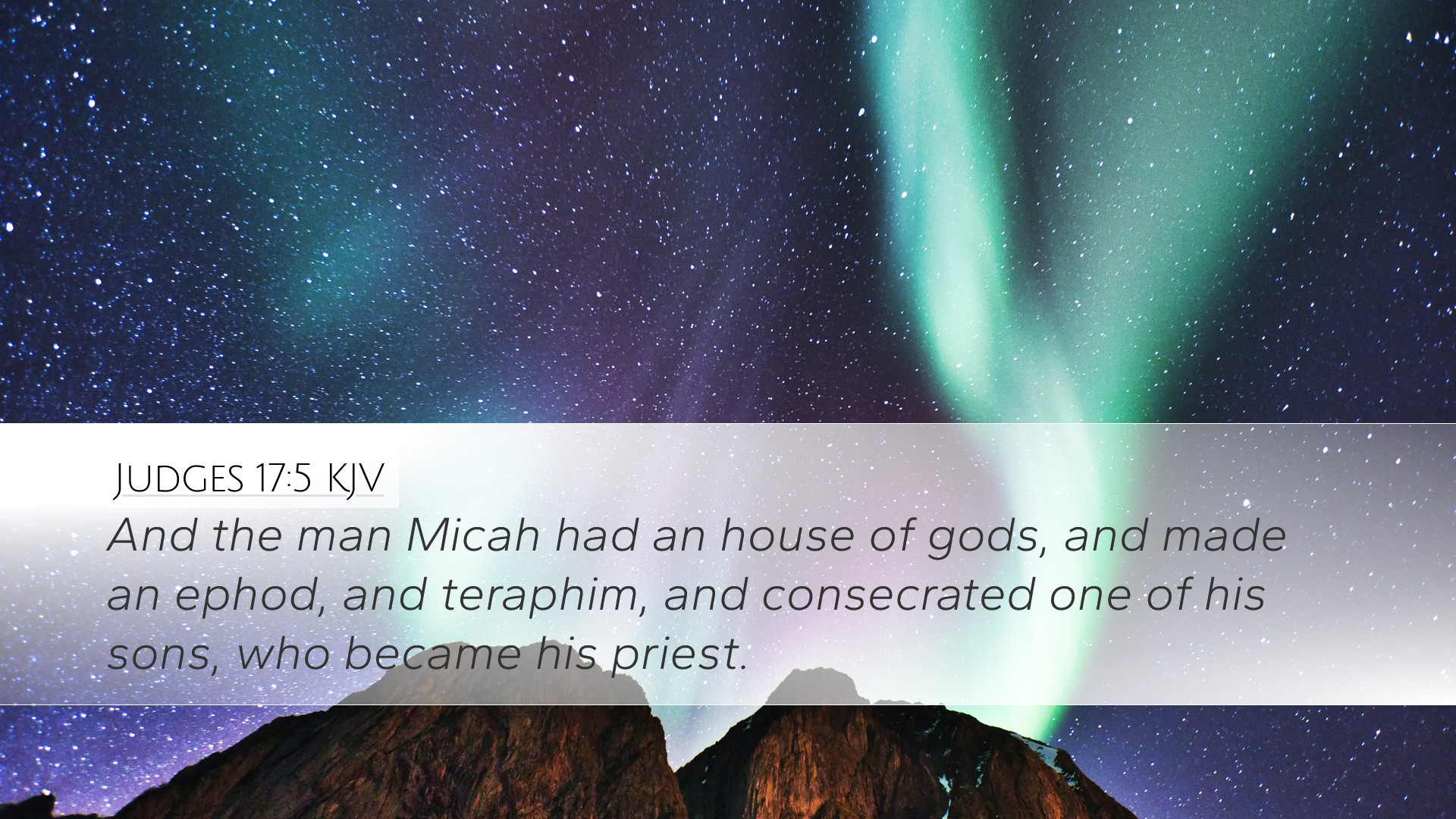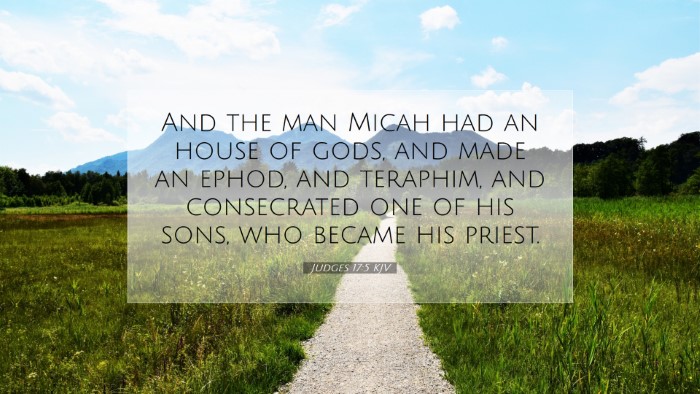Old Testament
Genesis Exodus Leviticus Numbers Deuteronomy Joshua Judges Ruth 1 Samuel 2 Samuel 1 Kings 2 Kings 1 Chronicles 2 Chronicles Ezra Nehemiah Esther Job Psalms Proverbs Ecclesiastes Song of Solomon Isaiah Jeremiah Lamentations Ezekiel Daniel Hosea Joel Amos Obadiah Jonah Micah Nahum Habakkuk Zephaniah Haggai Zechariah MalachiJudges 17:5
Judges 17:5 KJV
And the man Micah had an house of gods, and made an ephod, and teraphim, and consecrated one of his sons, who became his priest.
Judges 17:5 Bible Commentary
Commentary on Judges 17:5
Verse Reference: Judges 17:5 - "And the man Micah had an house of gods, and made an ephod, and teraphim, and consecrated one of his sons, who became his priest."
Contextual Overview
The Book of Judges is set during a turbulent period in Israel's history, marked by moral decay and spiritual apostasy. The events in this book illustrate the need for divine leadership and the consequences of disobedience to God. In Judges 17, we are introduced to Micah, a man whose actions symbolize the chaotic religious practices of Israel during this time. This verse is pivotal as it encapsulates many themes relevant to both the history of Israel and modern applications for faith communities.
Theological Insights
Idolatry and Religious Syncretism: At the center of this passage is Micah's idolatrous practices. The mention of “an house of gods” indicates that Micah, like many Israelites, adopted syncretism, blending Canaanite practices with Israelite worship. This reflects a broader trend in Israelite society—turning away from Yahweh to embrace a form of religion that appeals to personal desires and societal norms.
- Matthew Henry: He emphasizes that Micah’s actions reflect a corrupt heart leading to mixed worship, pointing out that every depraved mind, when left to itself, seeks not only to worship God but to integrate human-made deities.
- Albert Barnes: Barnes notes that the ephod represents divination practices that were now exercised outside of God's ordained methods, showing a complete disregard for divine law. He highlights the dangers of making personal interpretations of worship.
- Adam Clarke: Clarke offers a social commentary illustrating the implications of this idolatry on the people’s relationship with God, indicating that Micah’s behavior was symptomatic of the broader moral decay in Israel.
Character Analysis: Micah
Micah emerges as a central figure whose actions raise many questions about the nature of faith and the human propensity toward idolatry. His decision to create a house of gods and establish a priesthood underscores a significant deviation from true worship. In examining Micah:
- Desire for Control: Micah’s desire to control his religious practices reveals a heart that prioritizes personal autonomy over divine authority. He believed that he could tailor worship to suit his preferences.
- Spiritual Blindness: His actions demonstrate profound spiritual blindness—he creates an image of worship but misses the essence of what it means to be in covenant relationship with Yahweh.
- Consequences of His Actions: The selection of his son as priest suggests a familial tradition of idolatry, potentially perpetuating spiritual malpractice within his household.
Implications for Contemporary Faith Communities
This verse serves as a cautionary tale for modern believers. The dynamics in Micah’s household can be paralleled today in various communities that may prioritize personal inclination over biblically founded worship practices. In analyzing these implications:
- Idolatry Redefined: Today’s idolatry may not always involve physical idols but can manifest in priorities, ambitions, and distractions that usurp God’s rightful place in our lives.
- Authenticity in Worship: The story calls for authenticity in worship practices. Communities are urged to align their worship with Scripture and avoid the temptation to create “gods” that fit personal preferences.
- Spiritual Accountability: Just as Micah's family became involved in his idolatry, today's churches must cultivate an environment where believers hold one another accountable to faithfulness to God’s commands.
The Nature of Divine Priesthood
Micah’s consecration of his son as a priest demonstrates a critical departure from God's ordained structure for priesthood. The contextual understanding of priesthood in Israel was essential, as it was meant to reflect God’s holiness and serve His purposes.
- Priesthood Established by God: The established priesthood was meant to maintain the spiritual connection between God and Israel, a role that Micah usurps for personal gain.
- Consequences of Self-Appointment: The episode highlights the dangers of self-appointment in spiritual matters, underscoring the necessity of divine calling and the adherence to God's covenantal structure.
Conclusion
Judges 17:5 does not simply recount the actions of an individual in Israel’s history but serves as a reflective narrative that calls for introspection. The story of Micah implores contemporary readers and believers to critically evaluate their own worship practices in relation to Scripture, to recognize idolatrous tendencies in their lives, and to commit themselves to genuine worship of God, grounded in His revelation and authority.


